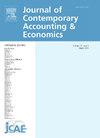Government fiscal stress and firms’ choice of affiliates
IF 2.9
3区 管理学
Q2 BUSINESS, FINANCE
引用次数: 0
Abstract
This paper investigates the impact of fiscal stress on the corporate structure of affiliates. When facing a high fiscal deficit, governments may prompt firms to set up subsidiaries rather than branches as subsidiaries pay more taxes locally. Consistent with the prediction, we find that fiscal stress is positively associated with firms’ tendency to establish subsidiaries, and that the relationship is weaker in cities with higher GDP or higher administrative hierarchy. We also show that firms’ incentives to obtain cheap land and public subsidies induce their cooperative behavior. Cross-sectional analyses indicate that non-SOE firms and those with higher growth potential are more likely to align with deficit-facing governments’ preferences. Overall, our findings suggest that governments play an important role in shaping firms’ organizational choice.
政府财政压力与企业对附属公司的选择
本文研究了财务压力对关联公司公司结构的影响。当面临高财政赤字时,政府可能会促使企业设立子公司而不是分支机构,因为子公司在当地缴纳更多的税。与预测一致,我们发现财政压力与企业建立子公司的倾向呈正相关,并且在GDP较高或行政等级较高的城市,这种关系较弱。企业获得廉价土地和公共补贴的动机诱导了企业的合作行为。横断面分析表明,非国有企业和那些具有更高增长潜力的企业更有可能与面临赤字的政府的偏好保持一致。总体而言,我们的研究结果表明,政府在塑造企业的组织选择方面发挥了重要作用。
本文章由计算机程序翻译,如有差异,请以英文原文为准。
求助全文
约1分钟内获得全文
求助全文

 求助内容:
求助内容: 应助结果提醒方式:
应助结果提醒方式:


